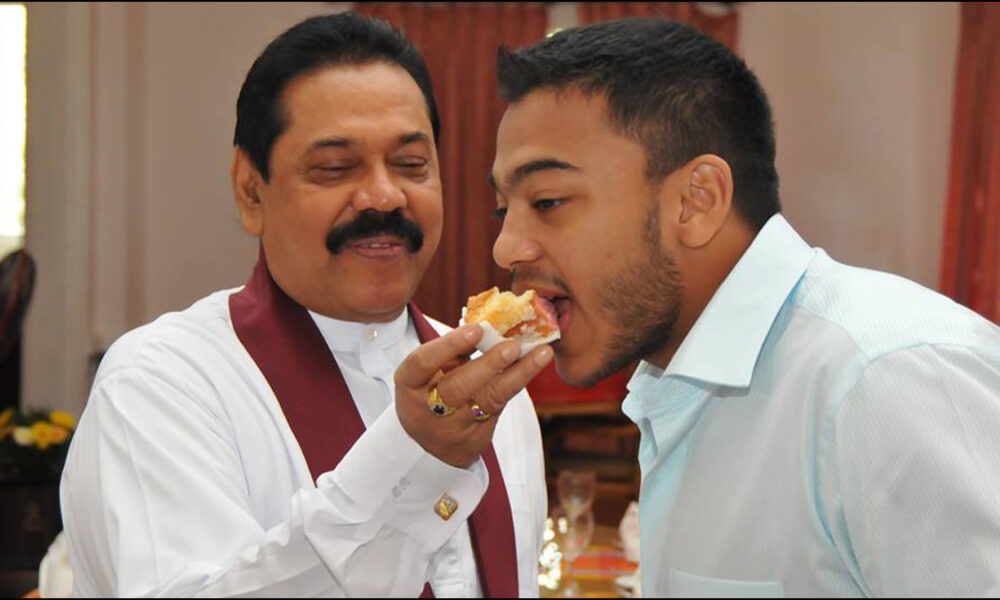-By Diplomatic correspondent

(Lanka-e-News -25.Jan.2025, 7.45 PM) Stanmore Crescent is a name that resonates with political history in Sri Lanka. Once the official residence of Mangala Samaraweera, it later became a hub of political activity under Mahinda Rajapaksa. This seemingly unassuming address transformed into a nerve center of power during Rajapaksa’s presidency. However, allegations now cast a shadow over its corridors—claims of wiretapping, financial scheming, and clandestine operations allegedly orchestrated by none other than Yoshitha Rajapaksa, Mahinda's son.
It’s a tale that reads like a spy thriller: a son, leveraging technology and proximity to power, allegedly tapped into the conversations of his father’s visitors. Businessmen, politicians, diplomats, and even family members who stepped into Stanmore Crescent had their discussions secretly recorded.
Sources suggest that the motive behind this wiretapping was not just information gathering—it was financial. Yoshitha Rajapaksa is accused of using these conversations to extract insider knowledge about deals, favors, and problems brought to Mahinda Rajapaksa. Armed with this information, Yoshitha reportedly positioned himself as a middleman, brokering deals, offering "solutions," and earning substantial profits in the process.
A retired Navy officer, who once worked closely with the Rajapaksa family, revealed shocking details. “Yoshitha was brilliant in his strategic approach, but unfortunately, he used it for personal gain. Conversations at Stanmore Crescent were no longer private; they were commodities he exploited,” the officer alleged.
The wiretapping saga doesn’t end at Stanmore Crescent. Allegations have surfaced that Mahinda Rajapaksa’s office at Temple Trees, another iconic political address, was similarly compromised. The revelation is particularly scandalous because it implies that even the highest seat of executive power in Sri Lanka was not immune to surveillance—by the president’s own son.
Critics argue that this breach of privacy and protocol could have had far-reaching consequences. Foreign diplomats and delegations meeting Mahinda Rajapaksa at Temple Trees were unknowingly exposed to Yoshitha’s covert operations. Such actions, if true, would constitute a serious breach of diplomatic protocol and could tarnish Sri Lanka's reputation on the global stage.
Adding fuel to the fire are allegations involving state banks. Several former chairmen of state banks have come forward, claiming they received phone calls from Yoshitha Rajapaksa, instructing them to release large sums of money to specific accounts. These funds, reportedly running into millions, were allegedly distributed as loans or overdrafts to individuals handpicked by Yoshitha.
The true scandal lies in the rumored kickbacks. Those who received these funds are said to have paid a “cut” to Yoshitha, effectively making him a financial middleman. This alleged manipulation of state resources not only raises ethical concerns but also calls into question the integrity of Sri Lanka’s financial institutions during the Rajapaksa era.
Beyond wiretapping and financial meddling, Yoshitha Rajapaksa is also accused of orchestrating dubious property deals. Using information gleaned from private conversations, he allegedly identified lucrative land and property opportunities, positioning himself to profit at the expense of others.
One insider recounted a particularly troubling pattern: “Businessmen would visit Mahinda Rajapaksa seeking help with land disputes or property acquisitions. Yoshitha would intervene, pretending to assist, but in reality, he was securing his own interests. It was a blatant abuse of power and trust.”
The Rajapaksa family dynamic adds another layer of intrigue to the story. Allegations suggest that Yoshitha’s actions were not limited to external targets; he also sought to undermine those close to his father.
One name frequently mentioned is Malaka Silva, an honest Navy officer and a close confidant of Mahinda Rajapaksa. According to sources, Yoshitha viewed Malika’s relationship with Mahinda as a threat. “Yoshitha ensured that Malaka was kept at arm’s length from the president. It was a calculated move to eliminate competition and consolidate his own influence,” said a former aide.
The wiretapping scandal has also raised concerns about diplomatic breaches. Foreign diplomats visiting Mahinda Rajapaksa at Stanmore Crescent reportedly had their conversations recorded without their knowledge. This violation of diplomatic protocol is not just an embarrassment for Sri Lanka but also a potential legal issue.
Several diplomatic sources have hinted at the possibility of lodging formal complaints. “If proven, this could lead to significant diplomatic fallout. Trust between nations is built on respect and confidentiality, and these actions undermine that foundation,” said a senior diplomat based in Colombo.
The allegations against Yoshitha Rajapaksa have sparked widespread outrage, with many calling for a thorough investigation. Civil society groups, opposition parties, and even former allies of the Rajapaksa family have demanded accountability.
Legal experts argue that the alleged wiretapping, financial manipulation, and property deals constitute serious crimes. “These actions, if true, represent a gross abuse of power and a betrayal of public trust. The authorities must act swiftly to investigate and prosecute those responsible,” said a Colombo-based lawyer.
The Criminal Investigation Department (CID) has reportedly received complaints about the alleged wiretapping and financial schemes. However, critics remain skeptical about the likelihood of a thorough investigation, citing the Rajapaksa family’s continued influence in Sri Lankan politics.
The allegations against Yoshitha Rajapaksa are not isolated incidents but rather part of a broader pattern of power abuse during the Rajapaksa era. From accusations of corruption to human rights violations, the Rajapaksa family has faced numerous controversies over the years.
This latest scandal underscores the dangers of unchecked power and the need for stronger accountability mechanisms in Sri Lanka. As one political analyst put it, “The Rajapaksa family wielded enormous power, and this case shows how easily that power can be abused for personal gain. It’s a wake-up call for the nation.”
The Stanmore Crescent wiretapping scandal is a stark reminder of the risks posed by the intersection of technology, politics, and unchecked ambition. While the allegations against Yoshitha Rajapaksa are yet to be proven, they highlight the urgent need for transparency and accountability in Sri Lanka’s political system.
For now, the halls of Stanmore Crescent remain silent, but the echoes of its secrets continue to reverberate across the nation. The question is: will justice ever be served?
---------------------------
by (2025-01-25 14:06:23)
Leave a Reply